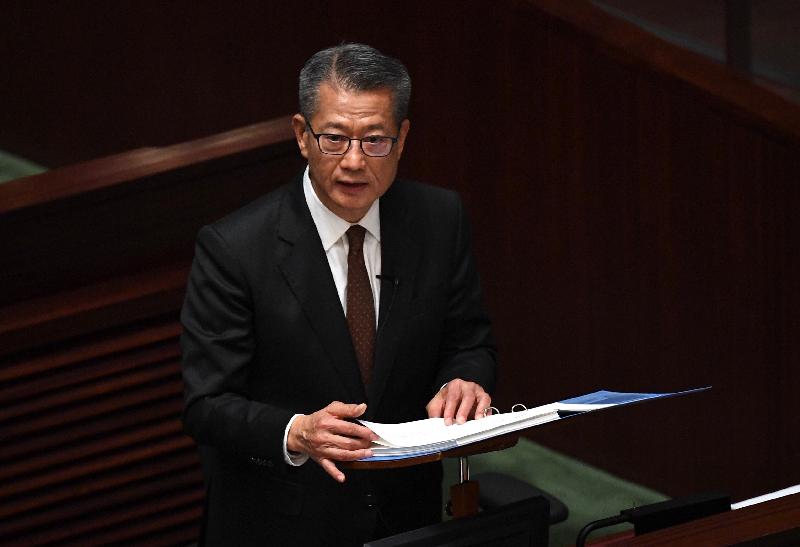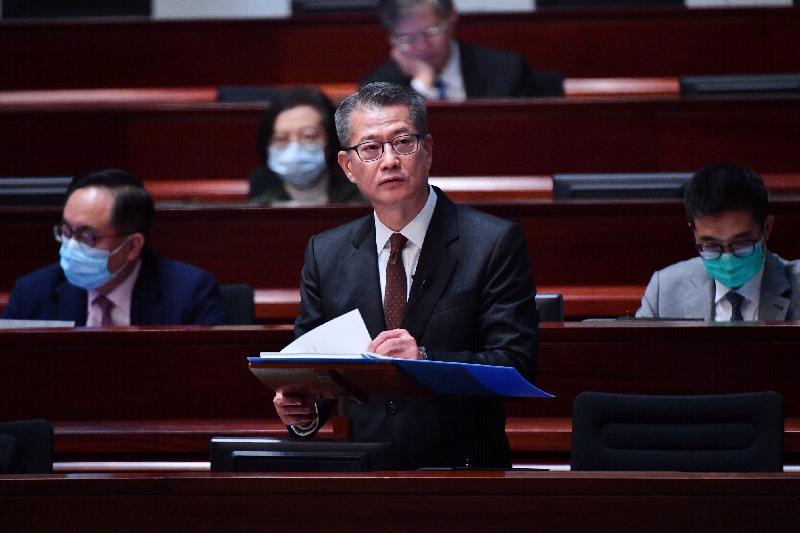Budget Speech by the Financial Secretary (1) (with photos/video)
****************************************************************
Mr President, Honourable Members and fellow citizens,
I move that the Appropriation Bill 2020 be read a second time.
Introduction
2. 2019 was an unsettling year fraught with obstacles and an unforgettable one for all Hong Kong people.
3. Early last year, we had already foreseen that our economy would be subject to considerable uncertainties due to the US-China trade conflict and other external factors. However, no one could have predicted that social incidents would break out in the middle of the year, which not only hit our economy but also broke our hearts. Before we could sort things out, there was an unexpected outbreak of the novel coronavirus disease.
4. Preventing and fighting against the epidemic, as well as deploying resources to alleviate the pressure on enterprises and the general public are our top priority. Last week, we established the $30 billion Anti-epidemic Fund to relieve the burden on those industries and employees in the eye of the storm.
5. In preparing this Budget, I put the focus on “supporting enterprises, safeguarding jobs, stimulating the economy and relieving people’s burden”. I am well aware that financial resources alone are not enough to tackle the challenges we are facing. However, making good use of fiscal reserves to support enterprises and relieve people’s hardship is certainly in line with our people’s expectations towards the Government under the current difficult environment.
6. Therefore, I have decided to implement counter-cyclical measures of a massive scale involving above $120 billion so as to meet the public’s expectations as far as possible. Although a record high deficit is envisaged in next year’s budget, I believe that only with such a budget can we help our community and local enterprises ride out their difficulties. I will go into more details about this in the ensuing paragraphs.
Economic Situation in 2019
7. The external environment was exceptionally austere in 2019. Confronted by the slowdown in growth across most economies and US-China trade conflict, Hong Kong’s total exports of goods fell by 4.7 per cent in real terms for the year as a whole. Hit by the violent social incidents, exports of travel services plunged and led to a fall of 10.4 per cent in exports of services for 2019 as a whole, the largest annual decline on record.
8. On domestic demand, private consumption expenditure began to weaken in the first half of 2019, and deteriorated abruptly in the second half of the year, resulting in a decline of 1.1 per cent in real terms for the year. Investment expenditure fell by 12.3 per cent in real terms amid subdued business confidence.
9. Hong Kong’s economy was already quite weak in the first half of 2019. Dragged by a host of headwinds, the economy entered recession in the third quarter and contracted by 1.2 per cent for the year as a whole, the first annual decline since the great recession of 2009.
10. As the economic situation worsened, the labour market gradually slackened. The seasonally adjusted unemployment rate went up from 2.8 per cent in the second quarter of 2019 to the latest 3.4 per cent, the highest in more than three years. Employment situations in many sectors came under pressure. The unemployment rate of the retail, accommodation and food services sectors as a whole rose to a three-year high of 5.2 per cent. The unemployment rate of the food and beverage services sector even rose sharply to 6.1 per cent, the highest in eight years, and its underemployment rate also went up substantially. Besides, household incomes began to weaken in the second half of 2019.
11. Overall price pressures remained largely moderate. However, consumer price inflation went up in the second half of 2019, mainly reflecting the sharp increase in prices of basic foodstuffs amid reduced supply of fresh pork. Netting out the effects of the Government’s one-off relief measures, the underlying inflation rate was 3 per cent for 2019, up 0.4 percentage point from 2018.
(To be continued.)
Ends/Wednesday, February 26, 2020
Issued at HKT 11:05
Issued at HKT 11:05
NNNN
Photo
Audio / Video
FS delivers 2020-21 Budget in LegCo
Related Links
Budget Speech by the Financial Secretary (2)
Budget Speech by the Financial Secretary (3)
Budget Speech by the Financial Secretary (4)
Budget Speech by the Financial Secretary (5)
Budget Speech by the Financial Secretary (6)
Budget Speech by the Financial Secretary (7)
Budget Speech by the Financial Secretary (8)
Budget Speech by the Financial Secretary (9)
Budget Speech by the Financial Secretary (10)
Budget Speech by the Financial Secretary (11)






